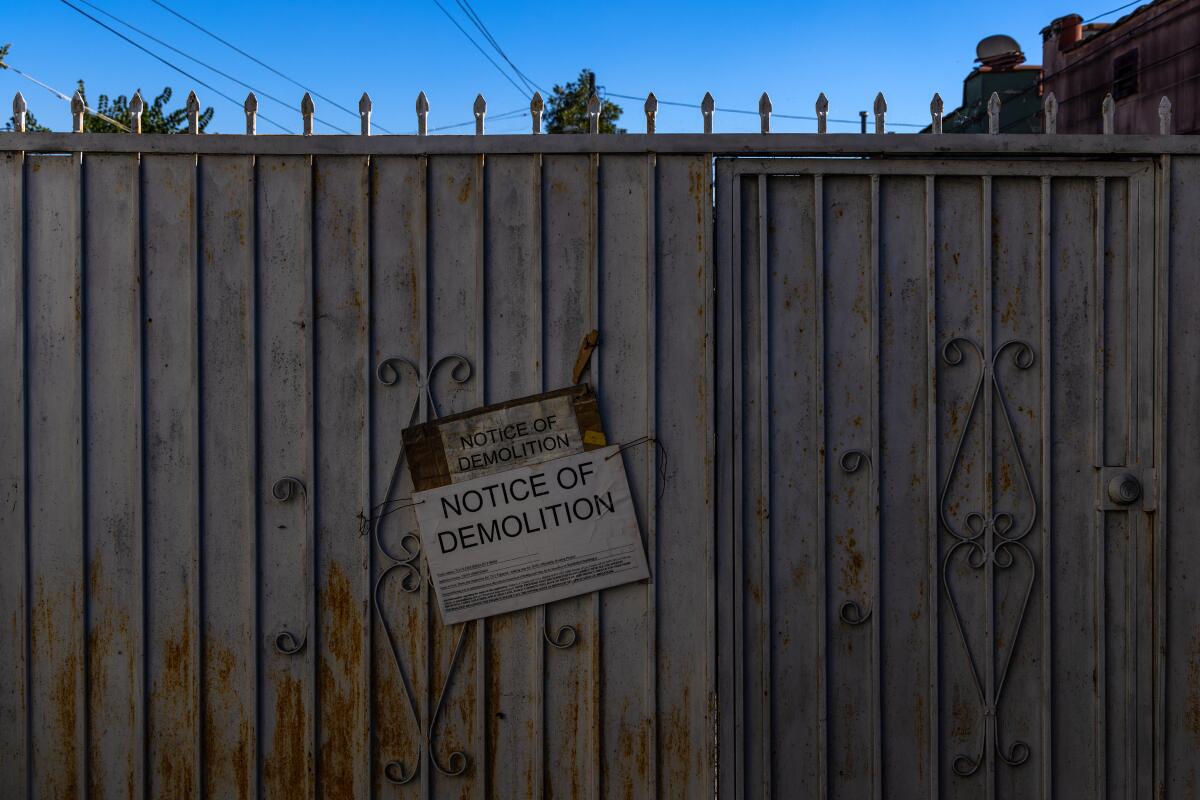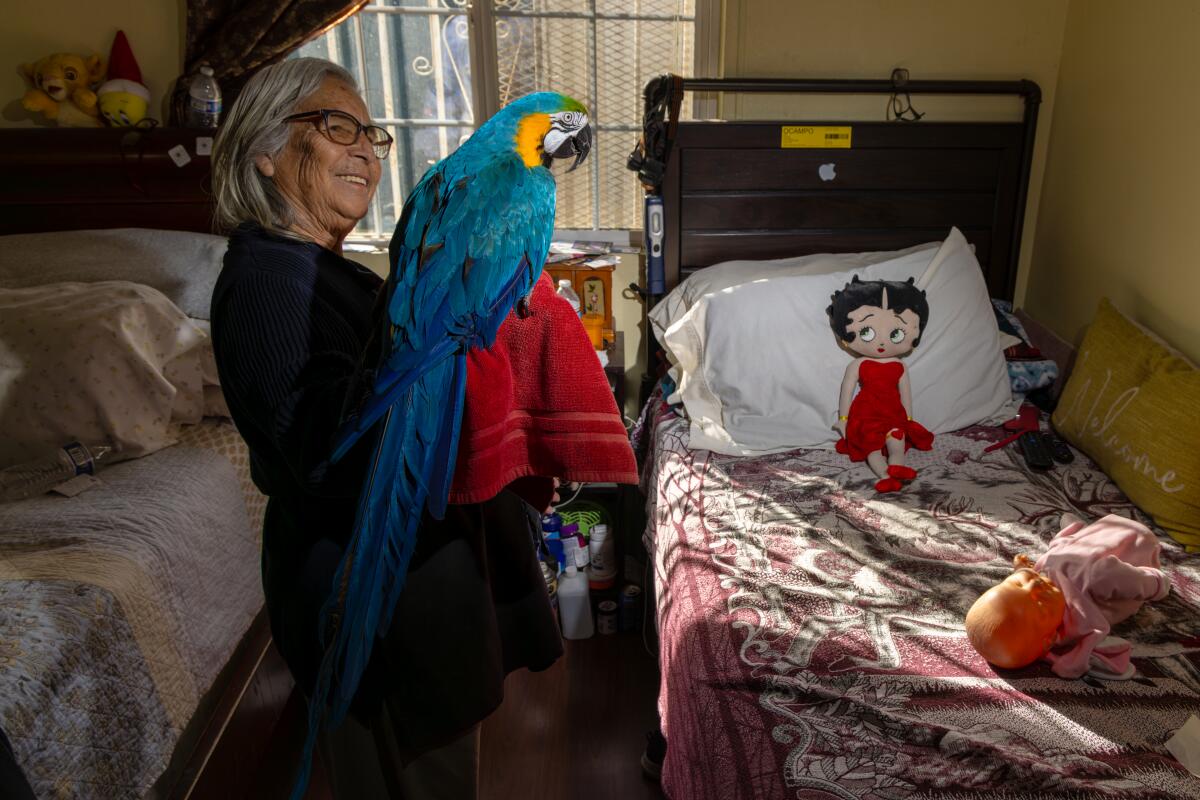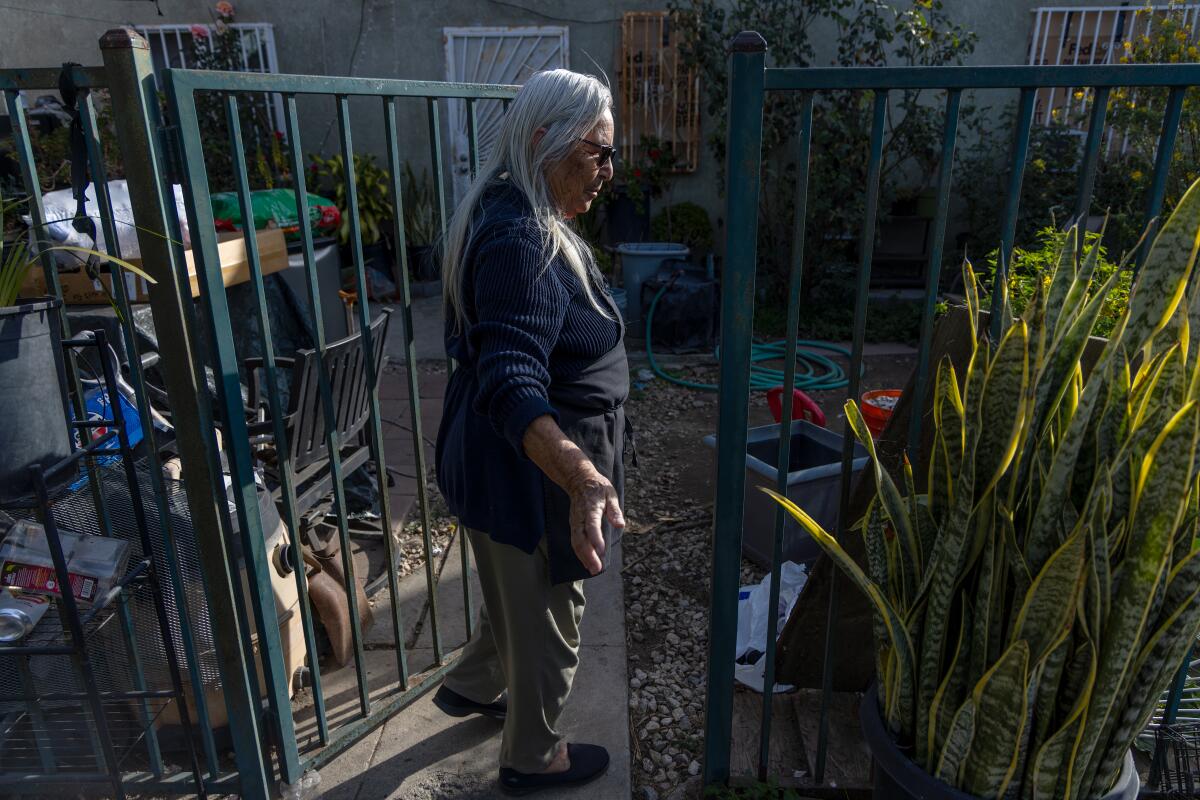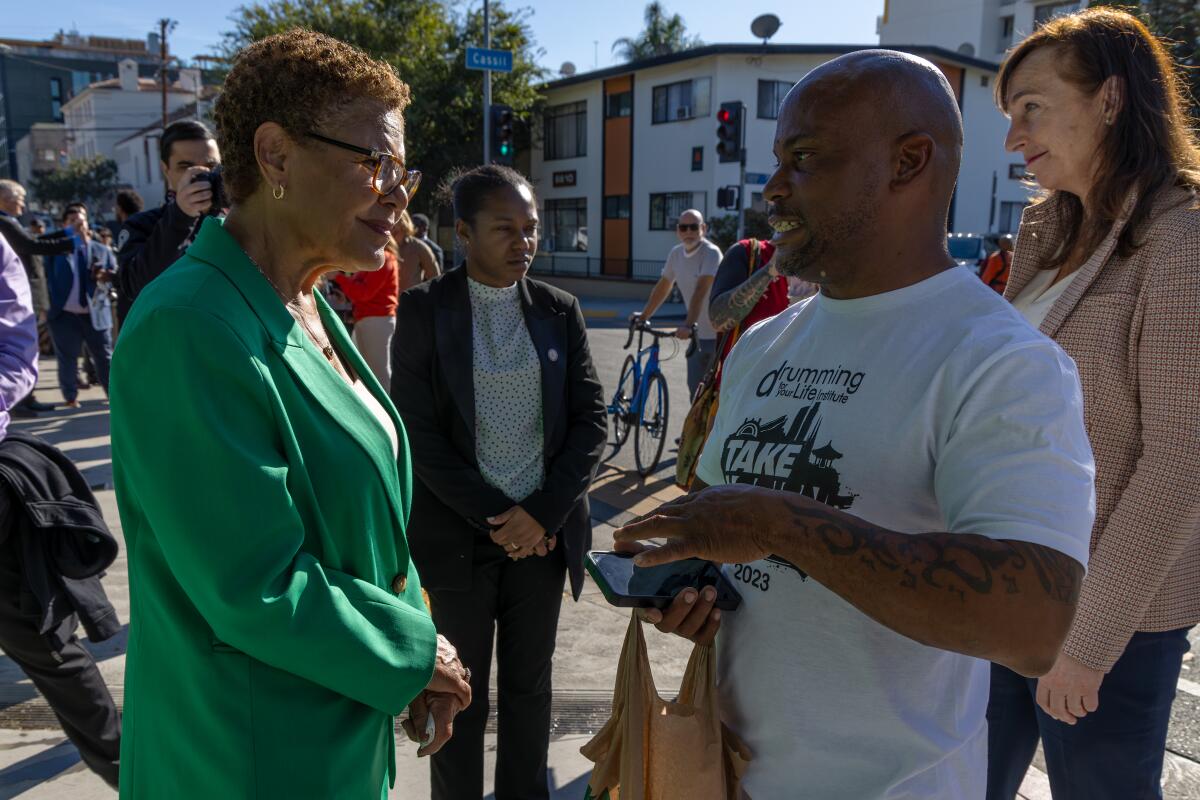L.A. is fast-tracking affordable housing. Some say those projects are pushing them out

- Share via
For the past seven years, Blanca Ruiz has tended each day to the lush garden outside the home that she rents on a noisy stretch of Figueroa Street in South Los Angeles.
The modest back house has been home not just to Ruiz but her husband and son, the couple’s four dogs and two tropical birds — Ludina the macaw and Sofia, a white cockatoo.
But that domestic setting was shattered earlier this year when Ruiz, 75, was notified that her home was slated for demolition to make way for an affordable housing project.
Because she is low-income and over 62, her family is eligible for nearly $25,000 in relocation payments. Still, rents are now so high, the prospect of finding another home is causing her restless nights and headaches.
So far, they have found that the apartments being listed either are too expensive or don’t allow dogs.
“I don’t sleep at night. I stay up thinking ‘What am I going to do? Where do I go?’” Ruiz said in Spanish, her voice cracking.

Ruiz is among the scores of residents who are having to relocate in the wake of Executive Directive 1, Mayor Karen Bass’ initiative to speed up the construction of affordable housing. Her apartment, along with two others nearby, is set to be replaced by a 157-unit affordable housing project, the kind Bass has pushed for aggressively as she seeks to combat the city’s homelessness crisis.
The fast-track approval process created under Executive Directive 1 is being credited with speeding up the review of more than 9,000 new apartments classified as “affordable” — where rents cannot exceed a certain amount.
Bass is looking to make that initiative permanent, converting it from an emergency order into a law that would eliminate public hearings, and some time-consuming review, for projects deemed 100% affordable.

But renters’ rights groups say the city first should enact more safeguards to protect tenants like Ruiz and her husband, both immigrants from Guatemala. Maria Patiño Gutierrez, who handles land-use policy for the nonprofit Strategic Actions for a Just Economy, said her group is especially worried about the loss of apartments regulated by the city’s rent stabilization ordinance, which limits the size of rent increases in older apartment buildings.
If the mayor’s program becomes permanent, the number of low-cost apartments targeted for removal will only continue to climb — especially in South L.A., she said.
“Folks are going to get pushed out of their neighborhoods,” Patiño Gutierrez said.
The debate over the mayor’s initiative is playing out in a city whose tenant protections are considered to be among the strongest in the nation.
Angelenos whose apartments are targeted for demolition are eligible to receive between $9,900 and $24,650 in relocation payments from their landlord, depending on such factors as their age, their income level and how long they have lived in their unit, according to city housing officials.
Nevertheless, renters’ rights groups want the city to do more to ensure that low-income renters whose homes are replaced by affordable housing aren’t forced to relocate dozens of miles away to less expensive areas such as the Inland Empire or High Desert. Those tenants should have access to an apartment in one of the new affordable projects that are built in their communities, advocates say.

Bass said she shares the concerns expressed by tenant advocates, and is carrying out an assessment of her fast-tracking strategy. In an interview, she said her team will look for additional ways to protect low-income renters as the city accelerates the production of affordable housing.
“Now that this has come to our attention, we are going to take a microscope to the program,” she said. “The goal of this is for people to live better, not to hurt people.”

Housing advocates view Executive Directive 1 — frequently referred to as ED1 — as one of the biggest successes of Bass’ year-old administration. During the first nine months of 2023, the city received applications for the construction of more than 12,000 affordable units, nearly double the amount proposed during the same period the previous year, city officials said.
More than 9,000 units have been proposed in projects deemed 100% affordable. So far, those developments are expected to result in the demolition of 195 rent-stabilized units across the city, the mayor’s team said last month.
That means that for every rent-stabilized apartment unit being demolished, 46 new affordable housing units have been proposed.
Bass said her office is looking at ways to make it easier for tenants like Ruiz to navigate the relocation process — and ultimately, move into the replacement project fast-tracked by the city. The mayor also intends to take a fresh look at the city’s relocation payments, not just for ED1 projects but other developments that replace existing housing.
Such a move could help tenants like Yolanda Renteria, who has lived in a World War I-era bungalow court since 2003. About two months ago, Renteria learned that her apartment and five others nearby were slated for demolition to make way for a 32-unit affordable housing project.
Although the developer of that project did not seek to use the mayor’s accelerated approval process, the project will be eligible for speedier review of building permits and utility hookups as part of ED1, city officials said.
Renteria said she and her husband will be eligible for $24,650 in relocation payments next year, when they turn 62 and qualify as seniors.
Still, that money could be quickly depleted. Renteria said she recently looked at a two-bedroom apartment that would cost $2,600 a month — nearly three times the $920 per month rent her family is paying currently for their one-bedroom home.
“Rents are expensive everywhere,” she said.
Because the couple qualifies as low income, they would be eligible to move into the affordable housing project built where they currently live. But that might not happen for one to two years, depending on the construction schedule.
Worries over displacement have grown so intense that even the planning commission, which is made up of Bass appointees, initially struggled to secure the votes to convert her emergency measure into a proposed ordinance.
Last month, the commission voted 4 -1 in favor of the ordinance, with Bass appointee Helen Leung casting the lone dissenting vote. Because planning commission proposals need five votes for passage, Leung initially succeeded in blocking the approval of the ordinance.
Leung said she wanted additional measures to shield low-income renters from displacement.
“I believe that [affordable housing] projects like this should be expedited, but not at the expense of vulnerable tenants,” she said.
The commission voted a second time minutes later, with Leung again blocking approval. After the panel took a short break, another planning commissioner joined the session, providing Bass the crucial fifth vote for passage.
The proposed ordinance is now heading to the City Council.
Councilmember Marqueece Harris-Dawson, who heads the committee that will review the ED1 ordinance, said he wants to make sure it doesn’t make things worse for South L.A.’s renters. Harris-Dawson, along with an array of housing advocates, also voiced concerns that the mayor’s initiative won’t be applied equally across the city.
Under the proposed ordinance, the streamlined approval process would not be allowed on properties zoned for single-family homes or apartments with four units or less, city officials said. Projects that do not comply with city zoning rules also would be barred from participation.
Scott Epstein, director of policy and research for Abundant Housing L.A., said the city could reduce the pressure facing low-income renters by allowing 100% affordable housing developments in wealthier neighborhoods, including those zoned for single-family homes.
“I think a big issue that is driving displacement is the fact that 70% of land in the city of L.A. is walled off from multi-family housing,” he said.

For Ruiz, the tenant living on Figueroa Street, the pressure has been intense.
Ruiz said she went to drop off her rent earlier this month at the office of Evolve Realty and Development, the landlord and developer, only to have a staffer refuse to accept it. She said the staffer told her the company never received her application for a one-year extension to stay in her unit — which, under city and state law, can be requested by seniors and people with disabilities — then informed her she had until Friday to move out.
Stefania Cozmiuc, regional manager with Evolve, said in an email that her company has accepted Ruiz’s payment.
Cozmiuc, in a response to questions from The Times, said her company had offered the Ruiz family $24,650 in city relocation, plus another $5,000, to move out by Friday, but is now working with the family on an extension.
If the Ruiz family stays beyond Friday, “we will continue to discuss other options with them,” she said.
Ruiz and her husband currently pay $1,560 per month for their two-bedroom unit, relying largely on his $33,600 yearly income working at a Toyota dealership. The family burned through its savings after her husband suffered a work-related injury, she said, and no longer has money for a deposit and first month’s rent.
Each year around Christmas, Ruiz usually puts up a nativity scene in her home, keeping it in place until Feb. 3, the day after the Christian holiday commemorating the presentation of Jesus Christ at the temple.
With so much uncertainty this year, she isn’t sure if she will.
More to Read
Sign up for Essential California
The most important California stories and recommendations in your inbox every morning.
You may occasionally receive promotional content from the Los Angeles Times.















